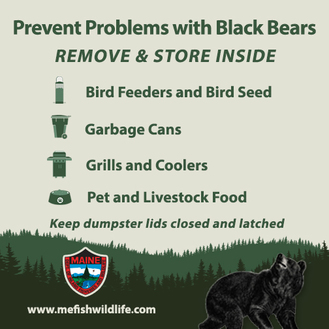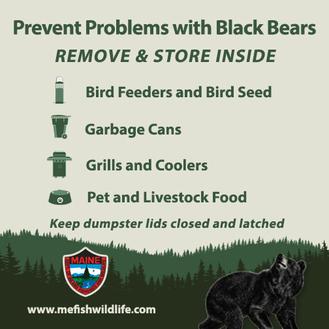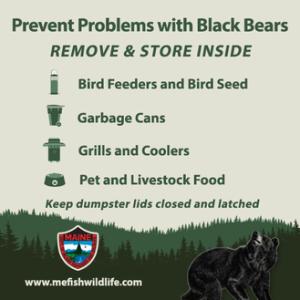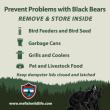Early spring, dry conditions bring black bears out of the woods, more conflicts with people
AUGUSTA — With an early spring and dry weather conditions, the Department of Inland fisheries and Wildlife is reporting that Maine's black bears have been causing more conflicts with many Maine residents this spring.
The MDIFW reminds homeowners that bears may be attracted to bird feeders, garbage cans, dumpsters and grills in backyards in the spring and summer, where food or the odor of food is prevalent.
When bears emerge from their winter dens in April throughout Maine, natural food is not readily available to them, meaning bears may be encountered in backyards where bird feeders and garbage containers provide bears easy access to food.
The number of bear conflicts usually diminishes during late summer when berries begin to ripen, making it easier for bears to find natural food. June is typically the busiest month for nuisance bear complaints.
Last year, the Maine Warden Service received 406 bear-related complaints, compared to 718 in 2014, another year with poor natural food levels. So far this spring, there have been 208 complaints received.
To avoid conflicts with black bears, MDIFW officials strongly suggest that homeowners take the following precautions:
Birdfeeders
• Take down bird feeders between April 1st and November 1st
• Rake up and dispose of bird seed on the ground
• Store remaining bird seed indoors
Garbage
• Keep garbage cans inside until the morning of trash pickup
• Keep dumpster lids closed and latched
• Never overfill dumpsters
• Dumpsters with plastic lids aren't bear proof and should be kept in a secure building or protected by fencing
Grills
• Remember to burn off any food residue, dispose of wrappers and clean the grilling area after use
• If possible, store grills inside when not in use
• If you're having bear problems, stop grilling for one to two weeks so that the bear will move on
Pet and Livestock Foods
• Store pet and livestock foods inside
• Feed pets and livestock inside
• If feeding animals outside, cleanup any uneaten feed daily
• Protect your livestock with fencing and bring them inside a secure building at night.
By taking these precautions, homeowners are more likely to prevent conflicts that could pose a danger to human life or require corrective action such as moving or killing a bear. Removing these food sources will also limit other backyard visitors (raccoons, skunks, etc.).
Event Date
Address
United States

























